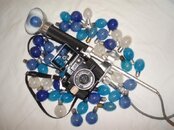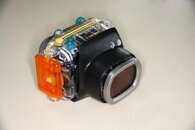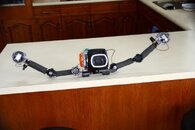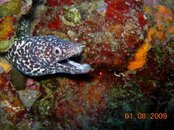To me - unless you are a good above water photog - you wont be a good under water photographer.
The only 'above-water' photos I ever take are of my drunk friends.... and yet....
Nudibranch in the Philippines - Sea Slug Underwater PhotographyScuba Tech Philippines
I've met lots of good (great) above-water photographers that struggle with underwater photography because of their core dive skills and lack of environment specific photography knowledge. You can learn to be a good underwater photographer from scratch - many of the same core photographic rules apply (
i.e. composition), but a relatively experienced diver will already have an appreciation of environmental specifics (
effects on light at distance/depth, subject behaviour, particulate matter in the water).
I'd rather teach a good diver how to photograph, than a good photographer how to dive... I know who'll get the best results first.
Plus unless you are going to spend a LOT of money, you will have a hard time getting good pics.
Utter rubbish.
I take my pics with an old, old Sony T-20 in OEM housing. It was free, because I found it (
it lived for 5 months in the sand at 40m depth). Any modern point-and-shoot camera, in an appropriate OEM housing, is going to take nice pictures for the purposes of a non-professional photographer.
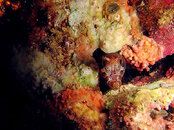
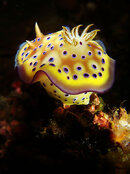
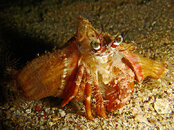
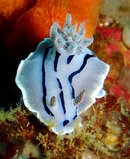
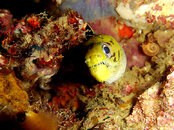
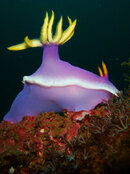
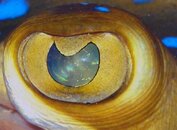
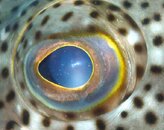

Practice makes perfect and if you learn the capabilities of your camera, you can work within those limitations to take appropriate photos of a good quality.
Using my humble camera, I've had photos published in magazines and entered in amateur-level photography competitions. So blaming the camera for the results really is non-starter.
This photo was published in a UK dive magazine. Taken with an Oly SP-350, flash was my hand-held torch... in British water, low viz, on a wreck dive, in current:
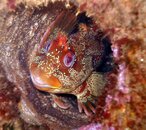
This photo of mine (at higher res/image size) is currently short-listed for 'Dive' magazine's monthly open competition. Again, it was taken with my DSC-T20; 8mp, auto-white balance only, no underwater modes, internal flash only, jpeg format only. It was also taken with a group of other divers in tow, in 8m viz, at 50ft depth...
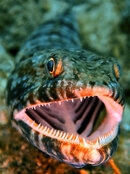
Excuses.... none.
Plus.....unless you are experienced at shooting in current (as I assume this relates to taking said camera to Cozumel?), you will have a hell of a time shooting anything as you go by in the current. Trying to stop to set up pics causes you to grab stuff, slow down the group, seperate the group, split the group, and generally piss off the rest of the group.
The same problems would effect a professional photographer using state-of-the-art equipment. The choice of dive operator is important for the eager photographer, as cattle-boat diving is far from ideal. Just pick a good dive operator and you won't have a problem. Hardly a reason to deter people from venturing into underwater photography as an enjoyable and productive diving interest.
The same is true for shooting in current, or low viz, or whatever... that's a matter of core diving skills. I firmly believe that
using a camera tends to encourage more development of critical diving skills, such as buoyancy, weighting, trim and overall control in the water.
The same can't be said for dive safety though. Using a camera adds task loading, which tends to also decrease overall situational awareness (
depth, time, NDL, gas and buddy awareness). One of the critical lessons for a new underwater photographer is to maintain situational awareness whilst otherwise pre-occupied with taking photographs. It's easy to get so focused on the camera that you lose track of other critical aspects of the dive. Use the buddy system effectively - and have your buddy act as a subject spotter and also a 'back-up brain' to maintain overall awareness. Understand your limitations - if you are a relatively inexperienced diver who hasn't
ingrained core dive skills, then you
must anticipate that you could lose track of things when otherwise task loaded. Take a pause after each group of shots to re-focus on the
dive itself.
Novice photographer + low end camera + current = bad pics and irritating the rest of the group IMHO.
Bad divers are bad divers. I'd class impatient, demanding divers who have no tolerance for those who are still learning, in the same category.
Pick the right dive operator, with the right DM, at the right dive sites... and there's no problem.
Better advice would be to say; When practising with your new camera, stick to shallow sites with undemanding conditions, with a well-motivated dive operation that will cater for your needs - so that you can concentrate on photographing choice subjects at your leisure, without placing undue stress upon your basic dive skills.
The relative cost and complexity of the camera used is, again, irrelevant as advice.
In many ways, a basic point-and-shoot camera in manufacturer housing is the
best choice for a novice underwater photographer. It allows the diver to develop their photography by concentrating on the non-technical critical attributes needed (
buoyancy, approach, control, understanding subject behaviour etc) without overwhelming them with technical concerns needed for the camera.
With decent dive skills and a bit of practice, it's easy to create some images that you'd be proud to distribute on Facebook or hang on your wall at home. They might not have the resolution to submit as paid work, but really.. that's a whole different level.
In summary, 10 tips:
1. Dive skill is more critical than photo skill for taking good photos.
2. Modern generation point-and-shoot, in manufacturer housing, is sufficient for really nice photos.
3. Understand the limits of your camera and work within them.
4. Dive the right sites to allow you to take easy photos, without stress from the water conditions.
5. Choose the right dive operation, who will understand your needs as an underwater photographer.
6. Choose your subjects wisely - a great photograph of a small, inactive critter is better than a blue blur from a passing fish.
7. Maximise your camera's capabilities by diving shallow, in good light and clear water.
8. Taking good photos underwater involves a lot of practice.
9. Divers should exhibit patience and understanding when other divers are still establishing new skills.
10. Don't forget your safety and situational awareness when task loaded with the camera.



 ):
):